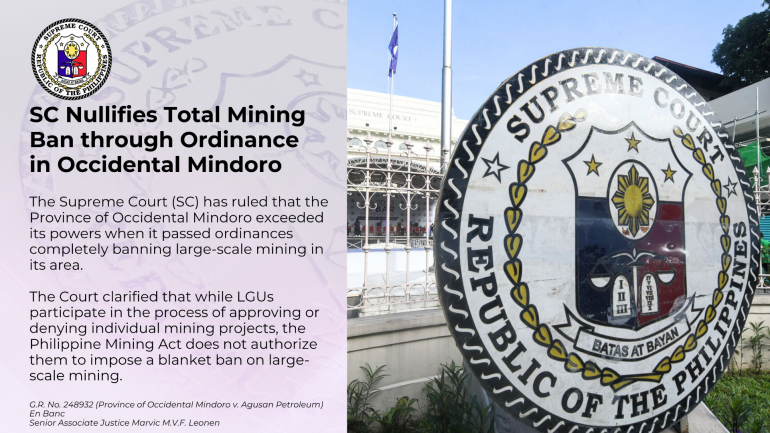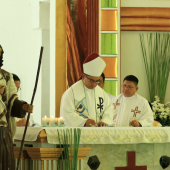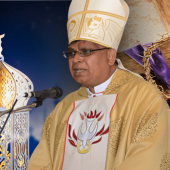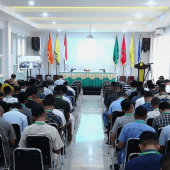Philippines Apostolic Vicariate of San Jose - Caritas Occidental Mindoro express concern top courts' rulling on mining moratorium

The Apostolic Vicariate of San Jose (AVSJ)—Caritas Occidental Mindoro expressed “deep concern” over the Supreme Court decision nullifying Occidental Mindoro’s 25-year moratorium on large-scale mining and upholding mining in the Philippines in a statement issued on May 18.
“As Caritas Occidental Mindoro, guided by the Gospel and the call of the Church to care for our common home, we express deep concern over the ramifications of the Supreme Court’s recent nullification of Occidental Mindoro’s moratorium on large-scale mining and its implications for our province and people,” it said.
It added a quote from Pope Francis’ Laudato Si’ #2: “The earth herself, burdened and laid waste, is among the most abandoned and maltreated of our poor.”
The Supreme Court recently ruled that the Province of Occidental Mindoro exceeded its powers when it passed ordinances completely banning large-scale mining in the area.
“While we recognize the authority of the state to manage our natural resources, we echo Pope Francis’ warning against a technocratic paradigm that values economic gain over human dignity and ecological balance. The experience of our communities across Occidental Mindoro reveals that large-scale mining projects, though legal, often threaten the sacred harmony between people, land, and life,” said the statement.
It said it is especially concerned about “the weakening of local voices and the rights of indigenous peoples, whose free, prior, and informed consent is often bypassed; the degradation of ecosystems and watersheds that sustain food, water, and cultural identity; the growing sense of despair among communities who see nature commodified and exploited, with little regard for long-term consequences.”
In light of Laudato Si’, it affirmed, “That the cry of the earth and the cry of the poor are the same; that any form of development must be rooted in justice, sustainability, and integral ecology; that mining policies must serve the common good and uphold the dignity of all creation.”
Appeal
In its statement signed by its director, Fr. Romer Cabrera, MMMP (Missionaries of Mary Mother of the Poor), the AVSJ-Caritas Occidental Mindoro made an appeal.
“We call on our government leaders to uphold the highest environmental standards, ensuring that the Constitution’s mandate for responsible stewardship is lived out in truth and justice,” it said.
It also called on “mining corporations to be transparent and respectful of the communities they affect, and on all people of faith and goodwill to stand in solidarity with creation and resist any actions that endanger our shared future.”
“Let us not forget that everything is interconnected. What we do to the earth, we do to ourselves,” it said.
In a press release on its website, the Supreme Court (SC) recently ruled that the Province of Occidental Mindoro exceeded its powers when it passed ordinances completely banning large-scale mining in its area.
In a 31-page decision by Senior Associate Justice Marvic M.V.F. Leonen, the SC En Banc nullified the province’s and the municipality of Abra de Ilog’s 25-year moratorium on large-scale mining, saying it violated Republic Act No. (RA) 7942, or The Philippine Mining Act of 1995.
“The ruling stemmed from a case filed by Agusan Petroleum and Mineral Corporation (Agusan), which argued that the ban violated its exclusive rights to mine in Mamburao and Abra de Ilog under a government-approved Financial or Technical Assistance Agreement (FTAA).
Agusan claimed the ordinances interfere with the state’s ownership and control over the exploration, development, and use of the country’s mineral resources. It pointed out that RA 7942 already provides environmental safeguards, so a total ban was unnecessary.
The Regional Trial Court declared the ordinances void, prompting the province to bring the case to the SC. The province argued that the ordinances were a valid exercise of its police power since their purpose was to protect the environment and the lives and safety of its residents. It also claimed that RA 7942 recognizes certain areas closed to mining activities, such as those “areas expressly prohibited by law.” It argued that “law” includes ordinances passed by local government units (LGUs).
The SC affirmed the RTC’s ruling and clarified that large-scale mining and exploration of mineral resources are legal under the Constitution and RA 7942. It emphasized that it is the state’s duty to promote these activities to support national development while also ensuring environmental protection and safeguarding the rights of affected communities.
The SC explained that all mining applications must undergo environmental impact assessments, which include prior consultations with LGUs. RA 7942 gives the LGUs the power to approve or deny individual mining applications based on their effects on the environment, livelihoods, and land rights of their residents. However, the law does not authorize them to impose a blanket ban on all large-scale mining in their area. Each mining application must be evaluated on a case-by-case basis.
The SC ruled that local ordinances are not included in the term “laws” that can prohibit mining under Section 19 of RA 7942. IIt was explained that the power of LGUs to issue ordinances comes from Congress, and interpreting “laws” to include local ordinances would, in effect, allow LGUs to override Congress’s authority to regulate mining—something they are not permitted to do.
The SC clarified that while LGUs have police powers to protect the welfare of their residents, they cannot use this power in a way that goes against the Constitution or national laws. Since the LGUs only derive their authority from Congress, they cannot regulate or prohibit activities that the state has already allowed.
In her concurring opinion, Associate Justice Amy C. Lazaro-Javier praised the province for its commitment to protecting the environment. However, she emphasized that good intentions cannot justify the use of powers that go against the law. She added that the province can still serve the best interests of its people by properly reviewing and approving Agusan’s mining application.”
Challenges ahead, not losing hope.
Norman Novio is the former program coordinator of the Social Action Center of the Apostolic Vicariate of San Jose, which strongly opposed mining. Now the municipal administrator of Sablayan, where the Mindoro Nickel Project applied for mining, says, “The Supreme Court is entrusting LGUs (local government units) with the responsibility to address and thoroughly review each application within their jurisdiction. We need to be prepared for this.”
Novio, in his reaction, added the nullification of the ban “also emphasizes the power of LGUs to scrutinize applications and deny them if necessary, especially by involving citizens in the decision-making process. This poses a significant challenge to newly elected officials in provinces and towns where there are pending mining applications.”
A 25-year mining moratorium was passed by Occidental Mindoro in 2009 after the Department of Environment and Natural Resources (DENR) revoked an Environmental Compliance Certificate it previously issued to Intex for the Mindoro Nickel Project (MNP). That was the time when Josephine Ramirez-Sato was governor, Mario Gene Mendiola was vice governor, and now Occidental Mindoro Governor Eduardo Gadiano was mayor of Sablayan town.
Oriental Mindoro province earlier legislated a 25-year mining moratorium in 2002, prohibiting any foreign and large-scale mining operations on the island after the Mineral Production Sharing Agreement (MPSA) related to MNP was canceled by the DENR.
The MNP is a mining project by a Norwegian mining firm, Intex Resources ASA, and its local subsidiaries, Intex Resources Philippines, Inc., and Aglubang Development Corporation. In MNP, Intex plans to mine 1.2 million tons of nickel in an 11,315-hectare concession area located at Victoria, Oriental Mindoro, and Sablayan, Occidental Mindoro.
In 2008, an ordinance declaring a 25-year mining moratorium on large-scale mining activities in Abra de Ilog in Occidental Mindoro was passed when Atty. Eric Constantino was mayor, and Floro Castillo was vice mayor.
The ordinance said, "There is an urgent need to prevent social, cultural, economic, and ecological loss associated with large-scale mining activities such as displacement of Mangyans and other upland dwellers, soil erosion, water, air, and land pollution, destruction of heritage areas, forests, and biological diversity, and the deterioration of coastal resources given existing poverty levels and the vulnerability of Abra de Ilog to the heightened risk posed by severe weather events and other impacts of climate change and existing geohazards."
According to an article in the Philippine Daily Inquirer, “the company, Agusan Petroleum and Mineral Corporation, owned by San Miguel Corp. president Ramon S. Ang, said the moratorium affected its rights under a 2008 agreement with the government that gave it exclusive authority to explore, mine, use, and market minerals from some 46,050 hectares of land located in Baco, San Teodoro, and Puerto Galera in Oriental Mindoro, and in Mamburao and Abra de Ilog in Occidental Mindoro.
Agusan was hoping to tap a potentially rich gold and silver reserve on the mining property, according to the Mines and Geoscience Bureau.”
Novio said the locals should be proactive. “Through local ordinances, Mining No Go Zones should be identified and established. Those communities are vulnerable to environmental destruction, like the fragile island ecosystem of Mindoro Island. Specifically, I am referring to Occidental Mindoro’s Key Biodiversity Areas, Island Ecosystems, Critical Watershed Areas, Geo-Hazard Areas, Natural Forests, Eco-Tourism Zones, and Agricultural Lands.”
Occidental Mindoro Governor Eduardo Gadiano said, “The people can still do something, if they don’t like a project, by putting pressure on the local government officials on the village, municipal, and provincial levels. He He said there is a challenge for the companies to socially prepare the people, prove that there is sustainable mining, and comply with several requirements.. Government officials should listen to the people.”
For Marius Agua, convenor and acting chair of Alyansa Laban sa Mina (ALAMIN)—Oriental Mindoro: “Now is high time for the three levels of the local Sanggunian to exercise their power to approve/disapprove projects and for the local chief executives to wait for the approval of the Sanggunian concerned before the local chief executives issue permits and notices to proceed. Legal battle indeed.”
Rodne Rodiño Galicha, executive director of Living Laudato Si, said, “It highlights the important role of local elected officials to strictly follow existing processes that involve community participation, and the people they serve can hold them accountable. In general, the ruling puts the responsibility on the LGU to address and scrutinize every application,” he said.
One of the 2018 Ten Outstanding Young Men awardees on environment and climate change, Galicha added, “About the requirement of prior informed consent under the Republic Act No. 7160 about Republic Act No. 7942, local governments have the authority to evaluate each application for a mining project to be conducted within their area, express their concerns or objections thereto, and withhold their approval if these concerns are not addressed.”
The national bearing of the SC’s ruling
For Jaybee Garganera, Alyansa Tigil Mina's National Coordinator, "This SC decision has clear repercussions for existing local efforts to resist destructive and irresponsible mining. We take the SC ruling as a balanced interpretation of our laws on local autonomy and minerals management. In the real world, where mining corporations and political dynasties rule economic decisions and management of our natural resources, this is not a just interpretation, from our simple view.”
The Chamber of Mines of the Philippines (COMP) is hopeful the ruling will pave the way for the reversal of similar restrictions like the 50-year ban on new mining applications in Palawan.
The Kalikasan People’s Network for the Environment said the decision is a “dangerous and precedent-setting move that exposes the profound flaws of the Philippine Mining Act of 1995, now in its 30th year. This decision tramples on the right of local governments and communities to defend their environment and welfare, all in the name of profit for mining corporations.”
Garganera has an appeal. “We are asking the different legal groups and public interest law organizations to review and give a briefing to environmental and climate justice networks and affected communities as soon as possible, so we may be able to craft our local responses with concerned LGUs.”
Radio Veritas Asia (RVA), a media platform of the Catholic Church, aims to share Christ. RVA started in 1969 as a continental Catholic radio station to serve Asian countries in their respective local language, thus earning the tag “the Voice of Asian Christianity.” Responding to the emerging context, RVA embraced media platforms to connect with the global Asian audience via its 21 language websites and various social media platforms.














